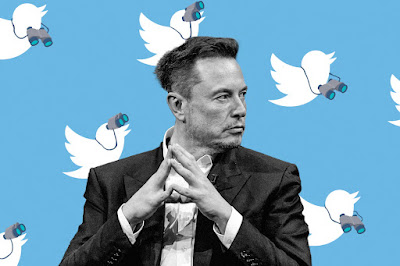Do you know who OrangeMike is? You should. He’s one of the
people who decides the truth on Wikipedia.
So why do so many people rely on Wikipedia for their own
version of the truth? If crowd-sourced truth is bad on Twitter, why is it
acceptable on Wikipedia?
The merging of these two worlds hit a nadir when Elon, in a
pathetic fit of rage, try to claim that the phrase “cis” as in cisgender was
considered a slur on Twitter. Of course, it’s not a slur. But after Elon sent
that tweet, one of his minions quickly changed the page of “cisgender” to make
it appear to be a slur. That was edited quickly, and the pains of crowd-sourcing
truth becomes quite clear.
Of course, you’re probably wondering what OrangeMike has to
do with any of this. Well, I found out about OrangeMike in the oddest way –
through pro wrestling.
In February, I was watching All Elite Wrestling (AEW) Dynamite
and the show took place in an arena called the Nutter Center. The name sounded
familiar to me as a pro wrestling fan, but I couldn’t place it. I Googled it,
landed on the Wikipedia page, and realized that I had heard of the arena. In
1993, it hosted the WWF’s King of the Ring, won by my all-time favorite
wrestler as a child, Bret Hart. An event notable enough to have its own Wikipedia entry.
The Wikipedia entry included a list of other pro wrestling
events, so I added in facts about the arena hosting AEW for the first time in
2023.
Who is OrangeMike? Why does he get to decide what’s notable?
His bio includes no information about what makes his version of the truth more
notable than mine, other than he is an admin and I am not.
This is an extremely innocent example, but I use it on
purpose. If we cannot trust Wikipedia editors on the details about a small
arena in Ohio, how can we trust them about anything?
When I was growing up, we used an encyclopedia. This was not
crowd-source truth. This was the experts in their fields determining what
needed to be known about their fields.
In fact, when I was in college at the turn of the 21st
Century, we were forbidden from citing Wikipedia in our schoolwork. The logic –
as sound then as it is today - was that the “facts” provided on Wikipedia were,
ultimately, biased facts. Even if done with the best intentions, the “facts” on
Wikipedia are being collected by volunteers, not professionals. Their biases
may not be purposeful or malicious, but they exist.
One of the most depressing things I heard in recent years while working in Washington, D.C. was learning that many Hill staffers go to Wikipedia first when learning about a new company. It’s hard to blame them – it appears to be the simplest way to get straight-forward information.
In an age where disinformation travels at the speed of light
on a constant basis, we all need to be more diligent about how information is
vetted, investigated, and confirmed.
We mock Elon Musk for his deranged fantasies about becoming
the sole source of truth. But Elon Musk’s Twitter is not the only
disinformation platform we need to worry about.
We’re in a battle over the truth, and we’re losing it.


Comments
Post a Comment